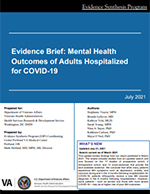
Prepared by:
Evidence Synthesis Program (ESP) Coordinating Center
Portland VA Health Care System
Portland, OR
Mark Helfand, MD, MPH, MS, Director
Recommended Citation:
Veazie S, LaFavor B, Vela K, Young S, Sayer N. A, Carlson K, O'Neil
M. Evidence Brief: Mental Health Outcomes of Adults Hospitalized for COVID-19. Washington,
DC: Evidence Synthesis Program, Health Services Research and Development Service, Office
of Research and Development, Department of Veterans Affairs. VA ESP Project #09-199; Jul
2021.
Download PDF: Rapid review, Supplemental Materials, Evidence Snapshot
In this rapid review, investigators conclude that while many patients experience mental health (MH) symptoms such as depression, anxiety, and insomnia during and 3 months after hospitalization for COVID-19, patients infrequently receive a new MH disorder diagnosis 6 months after hospitalization. These conclusions are based on the best available evidence: 17 mostly fair-quality studies (2 prospective cohort, 2 retrospective cohort, and 13 cross-sectional) that enrolled > 200 participants.
People who have been hospitalized for COVID-19 may be at high risk of mental health issues due to the stress of being hospitalized for a serious, highly transmissible illness during a pandemic. This rapid review compares the prevalence of mental health disorders among adults who have been hospitalized for COVID-19 to relevant comparison groups, assesses whether the prevalence varies by patient and disease characteristics, and ascertains patients' mental health care and resource needs.
The best available evidence indicates a high proportion of patients with COVID-19 experience MH symptoms during and 3 months after hospitalization (30-39% may experience anxiety symptoms, 24-40% insomnia symptoms, 20-26% obsessive-compulsive symptoms, and 10-15% PTSD symptoms). Estimates of depression prevalence vary widely across studies (9-66%) due to differences in symptom measurement and reporting methods. By contrast, a low proportion of COVID-19 survivors receive new MH disorder diagnoses in the 6 months after hospitalization (5% of patients will likely be diagnosed with a new mood disorder, 7% anxiety disorder, 3% insomnia, 2% substance use disorder, and 1% psychotic disorder). Some patients, such as women and those with severe COVID-19, may be at higher risk of poor MH outcomes than men or people with mild to moderate COVID-19. Future research should compare patients hospitalized for COVID-19 to those hospitalized for other reasons and evaluate mental health treatment utilization and resource needs following hospitalization.
Veazie S, Lafavor B, Vela K, et al. Mental health outcomes of adults hospitalized for COVID-19: A Systematic Review. Journal of Affective Disorders Reports. 2022(8):100312. DOI: https://doi.org/10.1016/j.jadr.2022.100312.